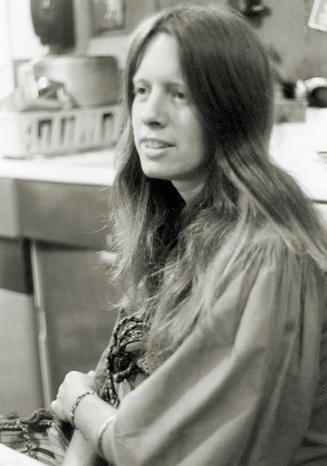Lyn Hejinian
A quick note on what is Thanksgiving in the
I am, in honesty, thankful for many things, from my family to my readers to my health. I’ve outlived the span of my own father’s life now by some 23 years, so I’m acutely aware that there are no guarantees. But this year one group of people I really want to note just how much I appreciate are my collaborators on the Grand Piano project. These are all people I’ve known for at least 30 years – Barrett Watten and I go back 43 years, Rae Armantrout and I 38.
Lyn Hejinian and I first appeared on facing pages in the magazine Arts in Society 40 years ago, tho I wouldn’t begin corresponding with her for another several years, and wouldn’t actually meet her until October 1976. I can recall the event exactly. There was a book fair at Fort Mason in San Francisco – the art fort as we thought of it in the years I lived in the City, a couple of piers and buildings of a decommissioned military facility turned over to non-profit use. Hejinian had a table for her Tuumba Press chapbooks, tho she had not at that point printed all that many of them, as number 4, Kenneth Irby’s Archipelago, was sitting there on the table with its deep blue cover and “Tuumba 4” & “November 1976” printed on the upper left & lower right corners of the cover and here it was not yet November.
Although I knew who Lyn was – we’d had a fitful correspondence earlier as I’d misunderstood what she was trying to do in her writing – and I knew, at some level, that she was the person responsible for Tuumba, so that this person behind the table very likely would be her, I just burst into some rhapsody about how wonderful I thought the poetry of Ken Irby was – still do, in fact – and that it was terrific to see that a new press existed that recognized this. She then introduced herself – count on her to have the better social skills here – and I apologized for being such an idiot during our correspondence, and we took it from there, a conversation that in some important ways is still continuing, in good part of late thanks to the Grand Piano. Irby must have been around that weekend as well – when did he moved back to
I think it’s remarkable that a group of friends – the circle doesn’t stop at the border of this particular series of books – can have the kind of lifelong sustaining relationships that we have had & are still having in the lives and work of one another. As a writing project, The Grand Piano is a fascinating, complicated, sometimes extremely difficult task. (Right this very moment, I’m ten days overdue on my assignment of turning in a draft of my section for volume six, the book in which I go first.) Although we are now in the second year of our actual writing & production of the series, we have been discussing this project now for ten years, mostly via email & a listserv. When I was in
It’s certainly true that The Grand Piano is a work empowered by the literary diaspora of the West Coast language poets & that it wouldn’t likely be happening now if we were all still living within a BART ride of one another. Yet in the past year, I’ve been most fortunate to see seven of my collaborators, eight including Bernheimer. Barry & Carla have been good enough to let me sleep under their roof, as has Tom Mandel & his spouse Beth Joselow. Bob Perelman & I have found ourselves at the gardening store buying plants together, or at least accompanying Krishna & Francie who are the knowledgeable ones in that domain. But the Piano gives us each so many other ways to be involved in each other’s lives – the work itself is an act of joy.
I look at other collaborative projects around poetry, such as the Subpress Collective that has produced so many important books in the past eight years or so, and I hope that there’s more to this experience for its editors than simply the process of taking turns putting out editions, each the lonely accomplishment of just one or two individuals. The real difference between the Grand Piano poets and so many of the other collective or collaborative literary formations over the past century always seems to me just how deeply and for how long we have meant so much to one another. Whenever I hear language bashing today, what I really hear most profoundly is an envy on the part of isolated individuals that language poets, so-called, seem to have such a big, loud, mostly happy family. It’s something I wish every writer had the opportunity to experience. So today I want to say thank you to Rae Armantrout, Steve Benson, Alan Bernheimer, Carla Harryman, Lyn Hejinian, Tom Mandel, Ted Pearson, Bob Perelman, Kit Robinson & Barrett Watten – your lifetimes of generosity are extraordinary.
§
Plus a special thanks today also to Geoffrey Gatza, who each year creates a menu of poetry for a member of the literary community for Thanksgiving. This year’s selection (which is now on the BlazeVOX website) is This is It, a feast in the shape of an alphabet, and the guest of honor c’est moi. It’s a sumptuous feast in several ways, those you’d expect and some you wouldn’t. I put on two pounds just reading the table of contents.






